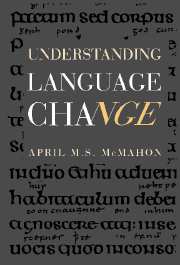Book contents
- Frontmatter
- Contents
- Preface and acknowledgements
- 1 Introduction
- 2 Three views of sound change
- 3 Sound change 2: the implementation problem
- 4 Morphological change
- 5 Syntactic change 1: the Transparency Principle
- 6 Word order change and grammaticalisation: language change and general laws
- 7 Semantic and lexical change
- 8 Language contact
- 9 Linguistic variation
- 10 Pidgins and Creoles
- 11 Language death
- 12 Linguistic evolution?
- Bibliography
- Index
11 - Language death
Published online by Cambridge University Press: 05 June 2012
- Frontmatter
- Contents
- Preface and acknowledgements
- 1 Introduction
- 2 Three views of sound change
- 3 Sound change 2: the implementation problem
- 4 Morphological change
- 5 Syntactic change 1: the Transparency Principle
- 6 Word order change and grammaticalisation: language change and general laws
- 7 Semantic and lexical change
- 8 Language contact
- 9 Linguistic variation
- 10 Pidgins and Creoles
- 11 Language death
- 12 Linguistic evolution?
- Bibliography
- Index
Summary
Introduction
Language death occurs in unstable bilingual or multilingual speech communities as a result of language shift from a regressive minority language to a dominant majority language
(Dressler 1988: 184)Dressler's definition immediately allows us to link the special social context of language death with its linguistic consequences: as we shall see below, language death essentially involves ‘normal’ linguistic changes, but occurring at an accelerated rate for particular sociolinguistic reasons. Language death consequently resembles pidginisation and creolisation, which together contribute to language birth, in several respects: all these processes involve linguistic contact; all are partly motivated by social factors; all involve characteristic subsets of linguistic changes; and all, although our knowledge of them is still rather limited, seem to have important implications for linguistic theory, language acquisition, and language change.
Although the study of language death as a field in its own right is very recent (the first major study is probably Dorian 1981), people have been aware that languages disappear for much longer. For instance, Swadesh (1948) is one of the earliest commentators on language death, although he concentrates almost exclusively on the social context of disappearing languages, rather than on structural changes which might result. Some early comments on dying languages are also judgemental in tone, condemning the speech of residual informants: we shall reject this evaluative approach, especially since, as Swadesh (1948: 234–5) notes, it seems that ‘…the factors determining the obsolescence of languages are non-linguistic. There are no such things as inherently weak languages that are by nature incapable of surviving changed social conditions.’
- Type
- Chapter
- Information
- Understanding Language Change , pp. 284 - 313Publisher: Cambridge University PressPrint publication year: 1994



